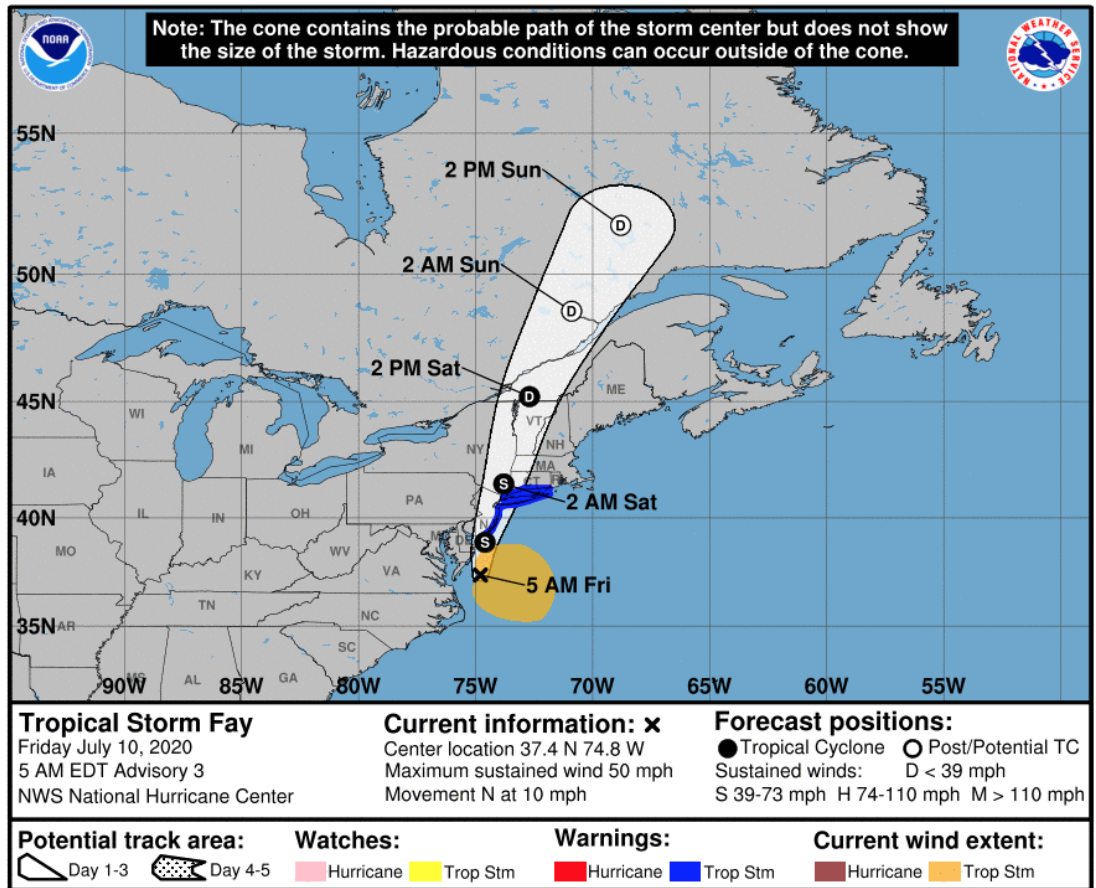How To Stay Safe During Tropical Storm Fay


BROOKLYN – Tropical Storm Fay is here! It is expected to be windy and rain all day today until 2 a.m. Saturday. The City has also issued a flash flood warning and it is in effect until late tonight. Please stay indoors and stay safe.
“We are working closely with National Weather Service to monitor Tropical Storm Fay and the potential impacts it may have to New York City,” NYC Emergency Management Commissioner Deanne Criswell said. “This storm is expected to bring strong winds and heavy rain tomorrow, so make sure you secure loose objects like garbage cans and patio furniture, charge cell phone batteries, and other devices, and take other necessary precautions.”
The storm is expected to bring a total of one to two inches of rain, but two to four inches may also be possible. There may also be severe thunderstorms. There will be 35 mph to 45 mph winds and gusts up to 50 mph. “Winds are expected to taper off overnight Friday into early Saturday morning. There is also the potential for high surf on Friday, with a high risk of dangerous rip currents on Friday and Saturday.” According to the U.S National Weather Service, the strong winds can cause downed trees and tree limbs, with power outages, with minor damage to roof and siding.

And keep an eye out for flash floods. Flash flooding can occur with little or no warning due to a large number of paved surfaces across the city. These surfaces do not allow rainwater to be absorbed into the ground and can result in storm drains often being overwhelmed, causing localized flooding, the city said.
You can report clogged catch basins and areas of standing water to 311.
Here are some tips for staying safe, as according to the city:
- If you live in a flood-prone area, keep materials such as sandbags, plywood, plastic sheeting, and lumber on hand to help protect your home.
- If you have a disability or access or functional need, make sure your plan addresses how your needs may affect your ability to evacuate, shelter in place, or communicate with emergency workers. Arrange help from family, friends, or service providers if you will need assistance.
- When outside, avoid walking and driving through flooded areas. As few as six inches of moving water can knock a person over. Six inches of water will reach the bottom of most passenger cars, causing loss of control and possible stalling. One or two feet of water can carry away a vehicle.
- Stay out of any building if it is surrounded by floodwaters.
- If you see downed electrical wires, do not go near them. Never attempt to move or touch them with any object. Be mindful that tree limbs, leaves, or water can cover downed wires from view. Always stay away from downed power lines because they could be live.
- Report downed wires immediately. If a power line falls on your car while you are in it, stay inside the vehicle and wait for emergency personnel.
Power Outages
- To prepare for a possible power outage, charge cell phone batteries, gather supplies and turn your refrigerator and freezer to a colder setting. If you lose power, items that need refrigeration will stay cooler for longer.
- Make sure your flashlights and any battery-operated radios or televisions are working. Keep extra batteries.
- If you lose power & have a disability, access and functional needs, or use Life Sustaining Equipment (LSE) & need immediate assistance, dial 911.
- Do not use generators indoors.
- Check on friends, relatives, and neighbors, especially older adults and people with disabilities, access and functional needs, or health conditions. Help them to prepare if needed.
Prepare For Strong Winds
- Check the area immediately surrounding your home for unsecured objects or potentially dangerous conditions. Tree limbs, garbage cans, yard debris, or other materials that can be moved by the wind are potential projectiles aimed at your home or parked vehicle.
- Bring inside loose, lightweight objects such as lawn furniture, potted plants, garbage cans, garden tools, and toys.
- Anchor objects that would be unsafe outside, such as gas grills or propane tanks.
- Close up and secure patio furniture.
- Secure retractable awnings.
- Remove aerial antennas and satellite television dishes.




